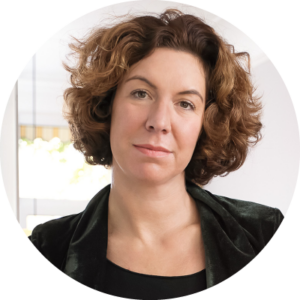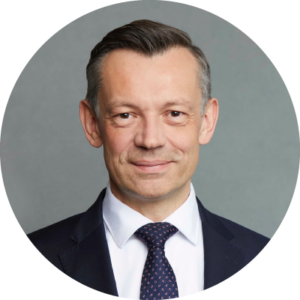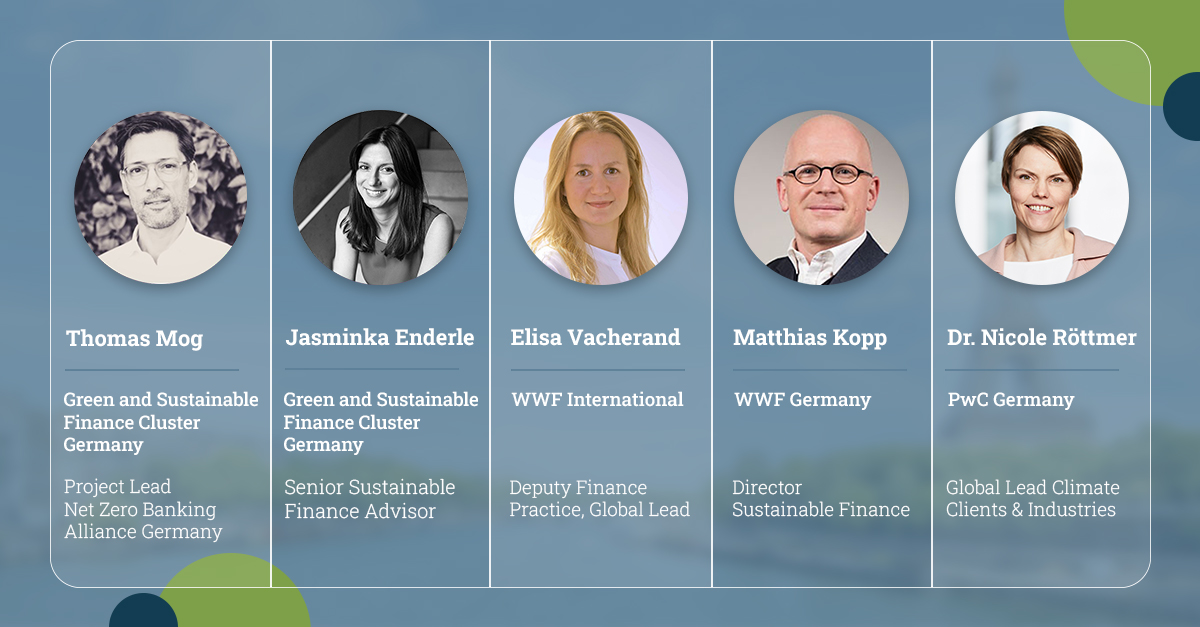Events
Due to complex interrelations of global economic processes, it is necessary to bring innovative forces and responsibilities from the financial sector, investing public, politics and civil society all together. As part of the Green and Sustainable Finance events, we promote and coordinate this dialogue.
On this page you will find information about upcoming and past events.
Cluster annual kick-off 2024: Presentation and discussion of the results of the Sustainability Transformation Monitor 2024 followed by a get-together
The Sustainability Transformation Monitor is a joint project of the Bertelsmann Foundation, the Mercator Foundation and the University of Hamburg, among others, and measures the flow of information and thus the strategic interlinking of the financial sector and the real economy in favour of the necessary structural change.
On 1 February, this year’s results of the second STM survey will be presented in Berlin and shortly afterwards the Cluster is expecting members of the STM team in Frankfurt to present the results of the survey in a hybrid format and to evaluate the data together with you from a financial perspective. In addition, the utilisation of the STM results within the development and expansion of sustainable financial structures as well as further development possibilities for future surveys will be discussed.
Afterwards, the Cluster is pleased to invite participants to a get-together on site with informal discussions, finger food and drinks.
Key data on the event
Where: Frankfurt School of Finance and Management, Adickesallee 32-24, Frankfurt am Main und digital
When: 27 February, 16:00-18:00 with get-together afterwards
Background: The STM surveys experts in companies in the real economy and on the financial markets on the status of the transformation of the economy. A longitudinal survey on the socio-ecological transformation of the economy is used to identify drivers, success factors and obstacles that help and hinder the transition of processes, products and entire business models towards greater sustainability. The aim is to analyse the status of transformation in companies in the real economy and the financial sector. The focus is on the interlinking of both worlds for effective transformation financing.
Further information is available here.
The Green and Sustainable Finance Cluster Germany and the STM have already worked together in the past as part of the Sustainable Finance Gipfel Deutschland 2023. You can find more information here.
The Green and Sustainable Finance Cluster Germany and the STM have already worked together in the past as part of the Sustainable Finance Gipfel Deutschland 2023. You can find more information here.
| Agenda | |
|---|---|
| 4.00 pm | Welcome by the Cluster management |
| 4:05 pm | Presentation of the STM and Q&A
|
| 4.45 pm | Panel discussion
Host: Kristina Jeromin, Green and Sustainable Finance Cluster Germany |
| 5.40 pm | Discussion with participants |
| 6.00 pm | Get together |
Cluster Spotlight: Impact Investing or just ESG? Scientific findings and practical implementation
Date & time: October 17, 2023, 11:00 am- 12:30 pm
Format: online
Agenda
- Welcome & Moderation
Susanne Bregy, Head of Impact Investing, Phineo
- Kick-off: My Impact Journey
Antonis Schwarz, Impact Investor, Philanthropist and Impact Investing Consultant
- Speech: From ambition to impact – (how) can sustainable financial products generate impact?
Prof. Dr. Timo Busch, University Hamburg
- Discussion: Practical experience with the implementation of funds under Art. 9 SFDR – Impact or not?
Daniel Sailer, Head of Sustainable Investment Office, Metzler Asset Management
Sophie Kazmierczak, Chief Impact and Sustainability Officer, NEXT Generation Invest AG
Moderation: Michael Schmidt, Green and Sustainable Finance Cluster Germany
- Q&A
Sustainable Finance Summit Germany 2023 - We shape transformation
The Sustainable Finance Summit Germany, the signature event of the Green and Sustainable Finance Cluster Germany (GSFCG), comes in a new format in its seventh year. Instead of a one-day conference in Frankfurt am Main, this year’s summit will take place between 6 and 16 November as a series of various events at different locations in Germany. The cooperative summit concept is organized and supported by various initiatives and actors – all of whom have one thing in common: they are working hard to shape and finance economic structural change in order to ensure sustainability and thus future viability.
In the following you will get an overview of the cooperation landscape and the currently planned events. In the coming weeks and months, we will keep you informed about the content of the individual events and the associated activities of our partners. The registration phase for the summit is expected to start at the end of August. We would be very pleased if you would note the dates that are of interest to you in your calendar today.
Cluster Spotlight event on the Eurex ESG Clearing Compass
A new approach to obtain readily available ESG data for more transparency.
Eurex Clearing will present its new service “ESG Clearing Compass” which aims to support the sustainable transformation journey of clearing members and their clients.
What advantages do the ESG Portfolio Assessment and Visibility Hub provide? How can existing infrastructure be leveraged to channel data?
And more generally: How can the clearing industry contribute to the transformation?
We look forward to discussing these questions with you.
Together with Deutsche Börse Group, we cordially invite you to a webinar (in German or English) on 27 April from 9:30 – 11:00 am.
Speakers:
Elizabeth Regan, Senior Vice President at Eurex Clearing AG
Elizabeth has over 25 years of experience in financial markets from a trading and clearing perspective. During this time, she has worked on the development and implementation of innovative service offerings in various areas of the exchange. Elizabeth completed her undergraduate degree in business management and marketing at Cornell University, USA and her master’s degree in economics at the University of Hannover, Germany
Christina Sell, Chief Sustainability Officer Trading & Clearing at Deutsche Börse
Christina started her career at Deutsche Börse 2001. Before her promotion as Chief Sustainability Officer Trading & Clearing in 2021 she headed different teams in the exchange and clearing organization. She believes that collaboration, openness and endurance are required to tackle major challenges. The sustainable transformation is one of them. She studied German literature, political science and history at the Goethe University of Frankfurt am Main with a degree as Magistra Artium.
Net Zero Banking Alliance Germany releases Client Dialogue Tool and launches five-week feedback phase
23 March 2023, 9:30am -12:00pm
The time has come! The Green and Sustainable Finance Cluster Germany and the associated Net Zero Banking Alliance Germany (NZBAG) are pleased to announce the publication and testing phase of its Client Dialogue Tool (CDT), a guide to better understand and manage sustainability risks in credit financing. The presentation of the CDT will take place on 23 March between 9:30 and 12:00 at a hybrid event at the premises of the Frankfurt School of Finance and Management and digitally.
Everyone is talking about transformation finance. But what exactly is it and where does it happen, or where does it need to happen more frequently and in a more targeted way in the future? The banks involved in the NZBAG asked themselves these questions and it quickly became clear: transformation financing happens in the in-between of the financial and real economy, or more precisely, primarily in the lending business. Transparency is needed to ensure sustainable corporate financing on the part of the banks and thus to support the structural change of the real economy towards climate neutrality and reliably high social standards, and last but not least to reduce the risks in the loan portfolio. This transparency is created in dialogue between the bank and the company, with the aim of achieving a holistic understanding on both sides of the current and future requirements of the respective core business.
This is exactly where the CDT comes in. By providing a structured framework for discussion, it offers banks a low-threshold entry into this central dialogue with customers about the future. The questionnaire and an accompanying impulse paper address the top management levels in the banks and offer support for strategic considerations on the sustainable and thus competitive orientation of the banking business. The publication also addresses the implementation level in the banks and provides concrete orientation and support for employees in the customer business. See you on 23 March!
Cluster Spotlight event on the importance of biodiversity and the link to finance
Save-the-date: 15 December 2022, from 12:30-14:00
In recent months, we have on many occasions perceived the need to discuss the importance and context of biodiversity in relation to finance. Especially the increasing importance for measuring the sustainability performance of economic value creation came up frequently. At the same time, the understanding, metrics and benchmarks for action are still very incompletely present in the practice of day-to-day business.
We would very much like to provide a forum for this noted interest as much as the necessity to make progress and invite you, together with Climate & Company and WWF Germany, to a digital exchange on 15 December 2022, from 12:30-14:00, as part of the Cluster Spotlight dialogue format.
The following key aspects will be highlighted:
- The importance of biodiversity – for a sustainable orientation of the financial market.
- Biodiversity-related risks and impacts – Can bank portfolios be measured against biodiversity?
- Data and digitalisation – What data is needed and how can existing data gaps be closed?
- Biodiversity-related disclosure requirements – Overview and current status of discussions, exemplified on the topic of “deforestation”.
We look forward to a lively participation. Please note this will be a German language only event.
COP 27 Event at UN DP Pavilion
– Collaborative approaches for financing the transition
A presentation of approaches from Pathways to Paris Project and Net Zero Banking Alliance Germany to align real economy and financial institutions.
Transparency, dialogue and cooperation between companies and financial players are key prerequisites for meeting the Paris climate goal. How can these conditions be created?
What are collaborative approaches that improve FIs understanding of climate and systematically integrate climate criteria into their decisions? Which KPI can be used to measure a company’s contribution to climate protection? How will these instruments make it easier for companies to transition to sustainable business models?
We look forward to you joining us
at the UN DP Pavilion or via Livestream!
November 10th 2022
6:15 pm to 7:15 pm (OEZ)
Past events
Implementation of EU Taxonomy for real economy and banks
There has been a lot of reporting on the EU Taxonomy Regulation in recent months. The controversial discussion focused mainly on the handling of gas and nuclear energy.
The operational implementation of the taxonomy at the level of the real economy and for financial service providers, e.g. in connection with the approaching obligation to audit key figures, received comparatively little attention.
In this Cluster Spotlight event, we will therefore concentrate around the implementation of the taxonomy and shed light on the following questions, among others:
- What are the application dates and reporting obligations for banks and their customers from the real economy? How do these interlock?
- How can the extent to which they are affected be determined? What does the taxonomy then mean for companies in the real economy and for banks?
- What challenges are emerging for implementation? What is underestimated, where do misunderstandings exist?
Two solutions are presented for the initial orientation of real economy clients and implementation at banks: On the one hand, the FS taxonomy quick check tool for rapid impact analysis, and the VÖB Taxo Tool for banks, as an integrated front-to-back process management system.
We are pleased to have Christina Anselm (Frankfurt School) and Dr. Stefan Hirschmann (VÖB-Service) as speakers.
Due to the high relevance we provide for 30 min. Q&A.
6th Sustainable Finance Summit Germany 2022
– Cooperation and Transformation

This year’s Sustainable Finance Summit Germany took place on 14 October at the Frankfurt School of Finance & Management in Frankfurt. This year, the conference was organised by three heavyweights of the sustainable finance community. The Green and Sustainable Finance Cluster Germany continued last year’s cooperation with B.A.U.M. e. V. With VfU, the network and the appeal of the flagship event was once again expanded.
In addition to around 250 participants on site, the digital conference room recorded another 250 guests at peak times. The welcome remarks by the hosts were followed by key notes and video messages from Minister of State Tarek Al-Wazir, Minister of State Dr. Anna Lührmann, and Bundesbank Board Member Dr. Sabine Mauderer.
Afterwards, a panel of high-calibre experts first looked at the role of the financial sector in the context of transformation financing and the concrete implementation status of corresponding instruments and structures; in a further discussion round, an in-depth look was taken at the real estate sector, an industry with a high need for transformation.
After lunch, the time was again reserved for interactive workshops. In six parallel formats, the participants exchanged views on focus topics of transformation financing.
The workshops addressed issues around, e.g., the insurability of extreme weather events, the catalysing effect of the capital markets for transformation, the importance of alliances as a pre-competitive practice space on implementation issues, and concrete examples of transformation financing in the food sector.
Following the coffee break, the impulses and solutions developed here were brought back to the plenary and thus to the joint discourse in the context of a cross-workshop panel. Finally, Silke Stremlau, Member of the Board at Hannoversche Kassen and Chair of the Sustainable Finance Advisory Committee of the German government, highlighted the contents of the conference day; she combined this with an outlook on the role, the working structure and the content-related plans of the Advisory Committee. The summit closed with a farewell by the event team, not without heartfelt thanks to all contributors and participants. In addition to Judith Bogner, who once again moderated the conference with her very knowledgeable and confident hands, special thanks go to the organisation and technical team of the Frankfurt School, whose work laid the foundation for the successful event.
At the end of October, we intend to make parts of the conference programme, which were transmitted from the Audimax via the livestream, available on the Cluster homepage at https://gsfc-germany.com/veranstaltungen/. At the end of the year, thanks to the B.A.U.M. e. V.’s team, we can once again look forward to a comprehensive summary document of the conference. On behalf of the Cluster, we would like to thank all supporters who made this year’s Summit so special. May the inspiring impulses, the ideas developed and the networks forged have an impact far beyond the conference day and support the implementation of sustainable financial structures. We are already looking forward to the Sustainable Finance Summit Germany 2023!
5th Sustainable Finance Summit Germany 2021
– Strong inputs towards Berlin
In 2021, numerous impulses were given for Sustainable Finance in Germany: in February, the German government’s Sustainable Finance Advisory Council communicated its recommendations for a German Sustainable Finance strategy. The German government subsequently published 26 measures in May 2021.
In addition to the question of whether the measures are sufficient to make Germany a leading sustainable finance location, the focus of the summit was on raising awareness among the new federal government of the importance of a Sustainable Financial system for successful change.
Accordingly, the program took up important topics that are currently preoccupying politics, business, science and society. As in previous years, the GSFCG was keen to give all stakeholders a place at the conference and have their contributions integrated. The workshop formats was devised to foster interaction and allow for in-depth discussions alongside high-level panel discourses.
The public parts of the conference and the debates can be followed here:
December 9th 2021
Online event on the NZBAG discussion paper “Employees fit for Paris: Upskilling in banks for a climate-neutral Germany 2045
In the discussion paper “Employees fit for Paris: Upskilling in banks for a climate neutral Germany 2045” (please link paper here), the NCBAG proposes a curriculum for training bank employees on climate transformation. The aim of the paper is to establish minimum standards for a basic training on the climate crisis and the role and opportunities of banks in the transformation towards a climate neutral economy. The curriculum was developed in cooperation with experienced practitioners from eight banks participating in the NCBAG. We cordially invite interested parties from the banking sector, academia, consulting and other fields of activity to participate in the online event and join the discussion on basic training on climate transformation for employees.
23. September 2021
Paris-compatible portfolio management – On what methodological basis can banks measurably align their loan portfolios with the Paris climate targets?
Banks need to align their loan portfolios with climate transformation pathways to meet their climate change commitments. Steering models support this alignment process and enable measurement of portfolio alignment. Banks can choose between different models to steer their portfolios in a Paris-compatible way. Current discussions mainly focus on emissions-based credit portfolio steering, technology pathways, temperature scores and shadow pricing. The NCBAG primarily recommends emissions-based credit portfolio management and technology paths as management models. We will discuss how emissions-based credit portfolio steering as well as technology pathways can be used to define climate transformation pathways and how these models can be used to proactively shape the dialogue on decarbonisation with the real economy. In addition to the choice of steering model, the determination of a climate scenario and the measurement of alignment at portfolio level are relevant topics for effective steering of credit portfolios.
30. September 2021
Climate scenarios – What is the role of climate scenarios in managing credit portfolios in line with the Paris climate targets?
With the help of climate scenarios banks can better understand how emissions will need to evolve in order to achieve climate targets under certain socio-economic conditions. These scenarios are an important steering tool for banks in decarbonising their portfolios and developing transformation pathways. In the discussion paper, the NCBAG proposes minimum requirements for climate scenarios and scenarios to be preferred based on these. We will jointly discuss the role of scenarios in steering loan portfolios in line with the Paris climate targets and the choice of an industry-wide benchmark scenario.
7. October 2021
Measuring portfolio alignment with the Paris climate targets – Which metrics are helpful? How does comparability arise in the market?
Loan portfolios usually include various climate-relevant sectors. However, so far only a few banks use KPIs at portfolio level to measure the alignment of the entire portfolio with the Paris climate targets. NCBAG recommends the Climate Action Portfolio Indicator (CAPI) as a portfolio-level KPI to to provide transparency on the alignment of loan portfolios. In the context of the CAPI, we discuss how a bottom-up analysis of the loan portfolio could look like and which data are relevant for the analysis.
14. October 2021
Defining positive contributions to climate protection – How can the EU taxonomy be used to measure climate protection through loan portfolios?
A bank’s lending activities can have a positive impact on climate protection. Providing capital for innovative economic activities will accelerate the transformation of the global economy. We will discuss the NCBAG’s proposal to use the EU taxonomy as a KPI to measure positive climate change impacts in the loan portfolio and whether other KPIs may be suitable for measuring positive climate change impacts.
A brief intro to the Net Zero Banking Alliance Germany
8 July 2021 | 9:00 AM (UTC+2)
The Cluster invites you to the first conference by the Net Zero Banking Alliance Germany (NZBAG).
The NZBAG is an alliance of seven German banks: BNP Paribas, Commerzbank, Deutsche Bank, DKB, DZ Bank, ING and LBBW: They are committed to Sustainable Finance and have pledged to align their portfolios with the climate neutrality and the Paris climate targets. This means that CO2 emissions associated with investments or loans must be reduced to net zero by mid-century.
NZBAG is affiliated with the Cluster. The Cluster supports banks in developing pre-competitive principles and management approaches for Paris-aligned investment and loan portfolios. NZBAG is thus a pioneer in Germany and makes an important contribution to the German climate targets.
During the virtual meeting on 8 July 2021 from 9 am to 12 pm, we will discuss the status of quo of the NZBAG’s work and demonstrate how it will integrate with the strategic Sustainable Finance approach of the Cluster.
Experts from the financial sector and the real economy will debate key issues and initial solutions with the participants in three parallel workshops:
- Presentation of the discussion paper on climate-related portfolio steering – How can banks measure the alignment of their portfolios with the Paris climate goals?
- Transformation and innovation with and through SMEs – How can banks support German SMEs in their transformation?
- Data and digitalization – What data are needed and which methods help closing data gaps?
„In order to stop climate change – the effects of which have long since been noticeable – enormous investments are needed. This is why we are embracing the idea of private capital also being invested according to the principles of sustainability. The Cluster aims at further promoting this movement.“
Hessian Minister of Economy, Tarek Al-Wazir












